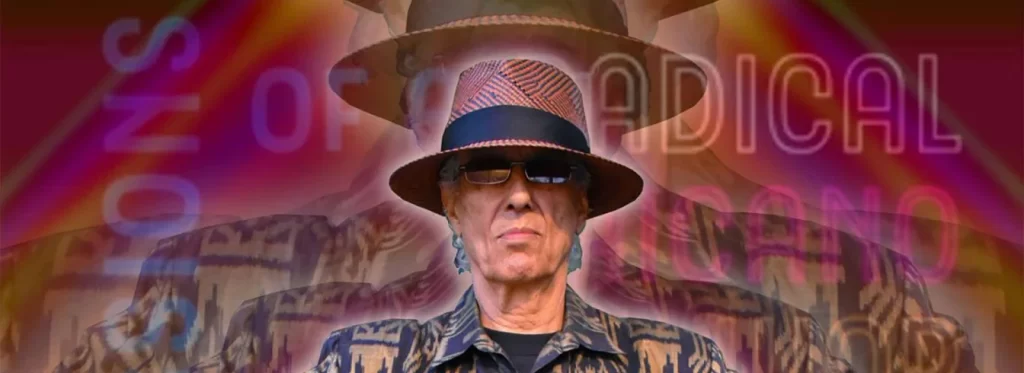“I saw the angel in the marble and carved until I set it free” —Michelangelo
By Roberto Leal
“Icon” is the most misused, overused and abused word in the English language. Everything from old TV shows and movies, vintage clothing apparel, celebs, record albums and even certain hamburgers are classified as iconic. “Legendary” is another word that has outlived its usefulness. It gets tossed around like cheap confetti. What is the one best word one can use to describe Rubén Funkahaultl Guevara? How can we fashion a tribute to this man and honor his achievements and avoid the shopworn cliches?

KCET’s original series Artbound presents an insightful tribute to Guevara titled “Con Safos” that offers the viewer a personal, up-close look at the man who over his lifetime has defined, refined and personified what we have come to know as Chicano culture through his music, art, poetry and vision.
He Built His City on Rock and Roll
Rubén’s father was an accomplished Mexican musician who taught his young son the beautiful, lilting rhythms and poetry of the bolero. Rubén found himself surrounded by traditional Mexican music but it was American rock and roll that ignited his heart and soul. He was inspired and influenced by the likes of Eddie Cochran, Gene Chandler, Jackie Wilson and early Elvis. Rubén developed a distinctive rock and pop, R&B and soul style of singing that eventually got him an appearance on Shindig, an early rock and roll music TV show.
However, like Richie Valens (nee Ricardo Valenzuela), the producers of Shindig didn’t feel their audience would accept rock and roll being performed by a singer with an obvious Latino name. Rubén recalls, “They wanted me to change my name to Jay P. Moby. I didn’t like it, but I wanted to be on the show, so my appearance on Shindig I’m billed as Jay P. Moby.” Rubén’s virtuoso solo performance on the show knocked it clean out of the park. He also more than held his own when he sang alongside the incomparable Bo Diddley .
As a pioneer of Latino rock, Rubén has not only created and performed the music but he has produced albums that are wonderful examples and compilations of Latino rock artists from Los Lobos to Cannibal and the Headhunters.
Chicano: From Pejorative to Symbol of Pride
The origins of the word “Chicano” have been the subject of countless scholarly articles, debate and speculation. Noted Mexican linguist Pilar Montes de Oca points out the prevalence of words in Mexican Spanish that begin with “ch,” like chato, chela, che, Chihuahua and the ever-popular chingar, have their linguistic roots in the languages of indigenous Mexican people. For older generations, Chicano was a term that described a person of low status, a rube, an undesirable. On a trip to Guadalajara, Rubén meets an older Mexican gentleman who asks Rúben where he is from. “I’m a Chicano from Los Angeles,” says Rúben. “Chicanos,” the old Mexican grumbles, “are mongrels with no culture.”
But there were cosmic forces swirling around in the universe in the 1960s that changed everything. There occurred a dialectical confluence of energies from the Chicano Awakening, La Raza political movement, Farm worker struggles, Teatro Campesino, zoot suit and pachuco culture, muralists, and Chicano graffiti art and music that resulted in the emergence and distillation of our Chicano identity. At the vanguard of all these seismic changes was Rubén Guevara. Through his rock theater performance art and poetry, he helped bring shape and definition to the Chicano Movement. He became the self-proclaimed Chicano culture sculptor.
During a visit to the Mayan ruins at Palenque, Rubén had an epiphany that resulted in a spiritual connection to his ancient Mexican ancestors. He felt he was reborn as The Neo Chicano Aztec God of Funk. It was then he adopted the name Rubén Funkahuatl Guevara.
Consafos
Consafos is a Chicano word that roughly translates to “exempt from danger.” It has other nuanced meanings but it is a word that is like a key that unlocks the greater meaning of being a Chicano. Consafos has its parallels in today’s computer language. Think of “Chicano” as the username and “Consafos” as the password that allows you to enter a realm of shared cultural experiences and knowledge.
Rubén’s poem/song, Con Safos, is a lyrical, mystical retelling of the history of the Mexican/Chicano/Latino people from the time of the Spanish conquest to the present day. It is our anthem and should be required reading and listening by anyone with a Hispanic surname living in America.
Rúben’s autobiography Confessions of a Radical Doo-Wop Singer has found its way into many Chicano Studies courses.
Still Rocking and Rolling
The guy just keeps on truckin’. “It’s still all about rock and roll for me,” says Rubén. He is still making music and has written a script for a musical play he hopes will see the light of day. Sadly, Rúben is not in the Rock and Roll Hall of Fame. Well, there is a Biblical analogy. Moses led his people to the Promised Land but was not allowed to enter it. But Rubén’s legacy in the history of Latino rock and Chicano culture is secure and unquestioned.
If there is one word that best describes Rubén Funkahuatl Guevara is “sculptor.” Like Michelangelo, Rúben saw Chicano in a piece of marble. Through his music, rock theater performance and passion, he carved until he set it free and by extension, he set us free to embrace the liberation of being a Chicano.
Artbound ‘s “Con Safos” airs on KCET’s ARTBOUND Series, Oct. 13.
Featured Photo: Rubén Funkahaultl Guevara (Credit: KCET)